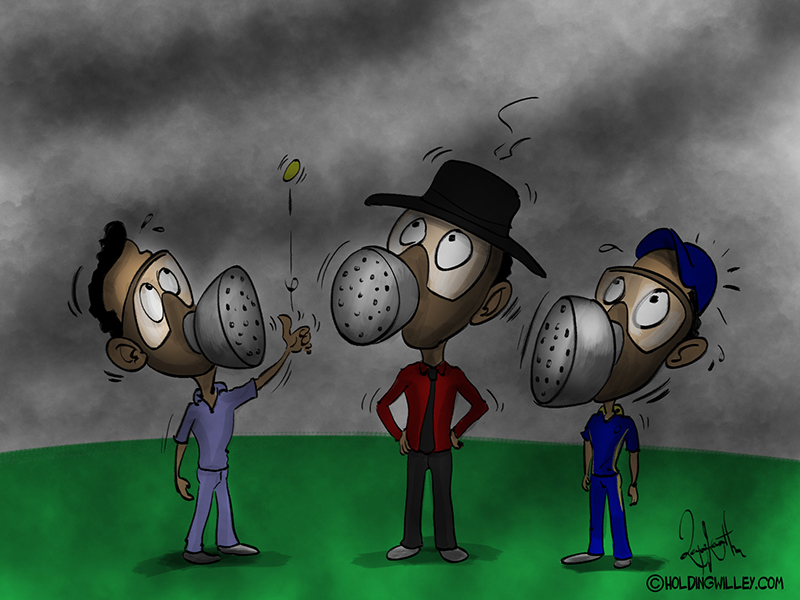 When Sri Lanka visited India last December for a full-fledged tour, the New Delhi Test attracted a lot of attention. In a first, at least for international cricket, the visiting players held up play in the third Test, complaining about the poor air quality. The players wore face masks while fielding to counter the pollution, and at one point refused to continue playing, which halted the match for nearly half an hour and forced India to declare their innings.
When Sri Lanka visited India last December for a full-fledged tour, the New Delhi Test attracted a lot of attention. In a first, at least for international cricket, the visiting players held up play in the third Test, complaining about the poor air quality. The players wore face masks while fielding to counter the pollution, and at one point refused to continue playing, which halted the match for nearly half an hour and forced India to declare their innings.
Sri Lanka’s reserve fielders also refused to take to the field, and some were reportedly vomiting as well. However, as nobody from the Indian team complained of uneasiness (though 12th man Kuldeep Yadav did wear a mask when bringing drinks to the Indian batsmen), the umpires decided against calling off the game.
This led to polarised reactions. While some said that the poor Delhi air would have been problematic for the Lankans as they come from a relatively cleaner and greener country, others accused them of creating an unnecessary fuss and also cheating.
Acting President of the BCCI CK Khanna had tweeted, "If 20,000 people in the stands did not have a problem and the Indian team did not face any issue, I wonder why the Sri Lankan team made such a big fuss.”
As the (acting) president of the board, Khanna should have behaved with a bit more dignity and not engaged thoughtlessly in the blame game.
Virender Sehwag claimed that stopping playing on Day 3 was a ploy to stop Virat Kohli from getting runs. He had tweeted saying, “It wasn’t like the weather changed in the afternoon. It seems like it was a strategy to stop Virat from getting 300. They kept complaining about the pollution, saying that their players had difficulty in breathing. They do put up a good acting performance.”
But even if Sri Lanka did put up a good acting performance, they couldn’t win the game, which ended in a draw.
The return of the masks
Almost a year later, face masks made a comeback in Delhi cricket: this time during a Ranji Trophy game held between Mumbai and Railways in Delhi’s Karnail Singh Stadium. Siddhesh Lad, Tushar Deshpande and Aditya Tare were among those who took to the field wearing masks.
Saurabh Walkar, Mumbai’s video analyst for nearly a decade, divulged more information on the same. Speaking to HoldingWilley.com, Walkar said, “[The] smog on Day 1 was as bad as smoking 25 cigarettes a day so almost everyone wore a mask. Tushar Deshpande was feeling breathless a day before the match so he had to visit the hospital, where he was prescribed a nebuliser.
“Lad was using the nebuliser before the start of the match on all five days. Suryakumar Yadav also faced problems and didn’t take to the field on Day 3,” he said.
Nobody from the Railways team complained of uneasiness, though. However, since there were no frequent interruptions and halts of play, the game and the masks didn’t garner as much attention as its international predecessor.
"Interesting picture of Siddhesh Lad batting with a pollution protection mask in Delhi. Still remember how some people ridiculed the Sri Lankans last year when they complained and played in masks" wrote Harsha Bhogle in a tweet.
Fans and pundits may have been too harsh in their criticism of Sri Lankan players, but that is in the past and, in any case, secondary. The primary question here is – why is the polluted national capital still allowed to host matches in winters?
The air quality in Delhi worsens in November, because farmers in neighbouring states burn the straw left behind after the harvest of crops. In 2016, BCCI cancelled two Ranji Trophy matches in the city as the conditions were deemed “unhealthy to play”. But the underlying question is, why schedule these matches in Delhi in the first place?
FIFA too had refused to accept Delhi as a venue for the U-17 World Cup knockouts for the same reason. It is time the ICC comes up with a policy on polluted venues, because the BCCI clearly will not, no matter how many precedents or how severe the consequences.
"Ideally, sporting events should not be scheduled in the winter months in Delhi," chest and lung cancer specialist Doctor Arvind Kumar had told AFP.
"We cannot expose our athletes to inhuman levels of pollution just because a few hundred crores (tens of millions of dollars) is at stake."
Either the city should do something to combat its pollution levels, or the cricket board must come up with alternate venues. Cricket must go on, but not at the risk of the players’ health.